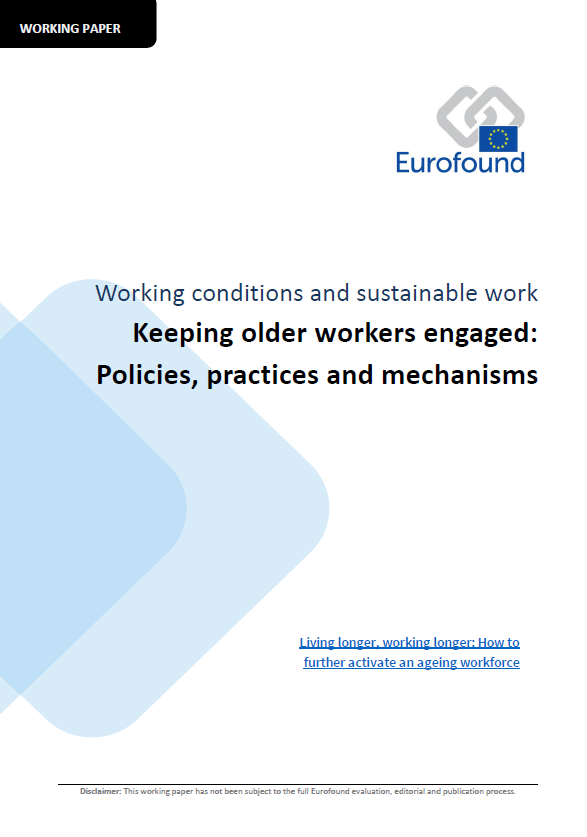EU context
Въпреки значителния ръст на заетостта сред по-възрастните работници през последното десетилетие в много държави от ЕС, Съвместният доклад за заетостта на Европейската комисия от 2017 г. подчертава потенциала за по-нататъшно увеличаване на тези равнища. През 2016 г. равнището на заетост сред по-възрастните работници на възраст между 55 и 64 години в ЕС възлиза на 55,3%, в сравнение с 66,6% за лицата на възраст между 15 и 64 години като цяло. Увеличението е най-голямо сред по-възрастните жени.
Европейският стълб на социалните права предоставя рамка за подпомагане на приспособяването на пазарите на труда към новите предизвикателства, като същевременно насърчава справедливостта и солидарността между поколенията. Той подчертава правото на работна среда, приспособена към професионалните нужди на работещите, която да им предостави възможност да удължат участието си на пазара на труда. Освен това сключеното неотдавна с европейските социални партньори автономно споразумение за активен живот на възрастните хора и за прилагането на подход на солидарност между поколенията е поело ангажимента да улесни по-възрастните работещи да участват активно и да останат по-дълго на пазара на труда.
Дейност на Eurofound
Eurofound разполага с дългогодишен експертен потенциал по проблемите, пред които е изправена застаряващата работна сила. Изследванията от 90-те години на миналия век акцентират върху участието на пазара на труда, ефективността на работата, условията на труд и предпочитанията за работа на по-възрастните работници в политическия контекст на променящия се демографски профил на Европа. Работата се съсредоточи и върху публичната подкрепа и инициативите в частния сектор, насърчаващи заетостта сред по-възрастните работници. Насочена беше към по-възрастните работещи жени, подчертавайки нарастващите равнища на заетост на тази група и нарастващия ѝ дял в работната сила, особено във възрастовата група 55—64 г.
Данни от проучването
Основните проучвания на Eurofound предоставят редица данни за положението на по-възрастните работещи. Шестото европейско проучване за условията на труд (EWCS) разглежда въпроса как по-възрастните работници да правят сравнение между различните измерения на качеството на работата. Въпреки че по-възрастните работещи, за разлика от по-младите, е по-малко вероятно да останат без работа, данните показват опасения от страна на по-възрастните, че ако загубят работата си, няма да намерят подобно платена нова работа и дори ще им е трудно да се върнат отново на пазара на труда.
Изследване въз основа на петото европейско проучване за условията на труд (EWCS) разглежда характеристиките на по-възрастната работна сила и работата в различни възрасти, както и факторите, които правят труда устойчив за застаряващата работна ръка: добри условия на труд, физическо и психично благосъстояние и равновесие между професионалния и личния живот.
Европейското проучване Eurofound за качеството на живот (EQLS) съдържа констатации, свързани с възрастта, по отношение на различните измерения на качеството на живот в Европа. Анализ на предпочитанията за работа след 50-годишна възраст се базира на констатациите от третото EQLS и показва, че много по-възрастни работещи предпочитат да работят по-малко часове, дори и след като вземат предвид финансовите си нужди. Улесняването на това по-тясно съответствие на работното време с предпочитанията може да даде възможност и да мотивира хората да работят по-дълго.
По-дълъг професионален живот
Наскоро Eurofound се присъедини към три други агенции на ЕС в прегледа на благоприятния за възрастта труд в Европа, политическите предизвикателства, свързани със застаряващата работна сила и иновативните решения.
Много от работещите не са в състояние или нямат мотивация да работят до законоустановената пенсионна възраст. Съществува обаче група, която има възможност и желание да работи след пенсиониране. Eurofound разследва това все по-нарастващо явление, свързано с полагането на труд след пенсиониране.
Последните изследвания са насочени към удължаване на професионалния живот чрез гъвкави схеми за пенсиониране, като по-специално се акцентира върху схеми за частично пенсиониране, които могат да улеснят това. Анализите в средата на кариерата също могат да допринесат за по-дългия професионален живот. Проучването е изследвало как тези анализи могат да окажат подкрепа при изясняване възможностите на работещите да останат на работа до по-късна пенсионна възраст. То подчертава различните инструменти, разработени от частния сектор за задържане на застаряващите работещи.
Други изследвания документират националните и секторни инициативи на правителствата и социалните партньори за задържане на по-възрастните работници на пазара на труда, включително финансови стимули и по-добри условия. В предишен проект бяха анализирани инициативите за управление на възрастта, въведени преди и след рецесията, за да се подчертаят добрите практики в частния сектор в Европа.
Ресурси
























